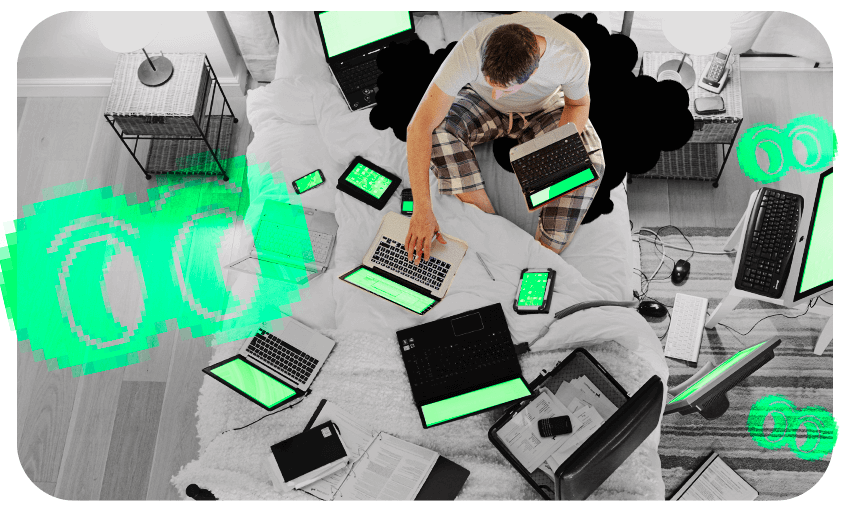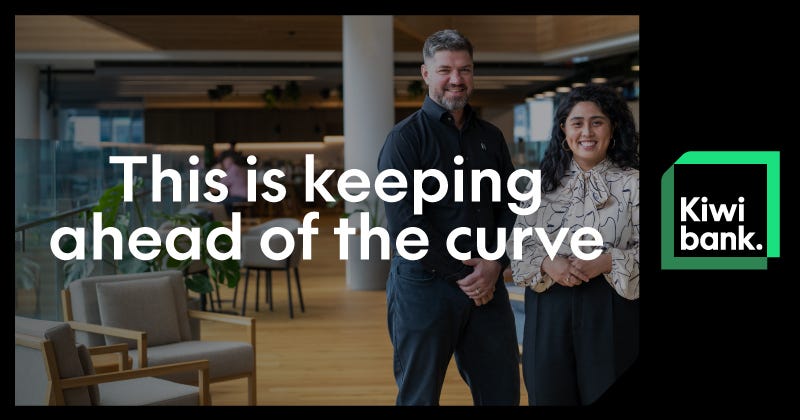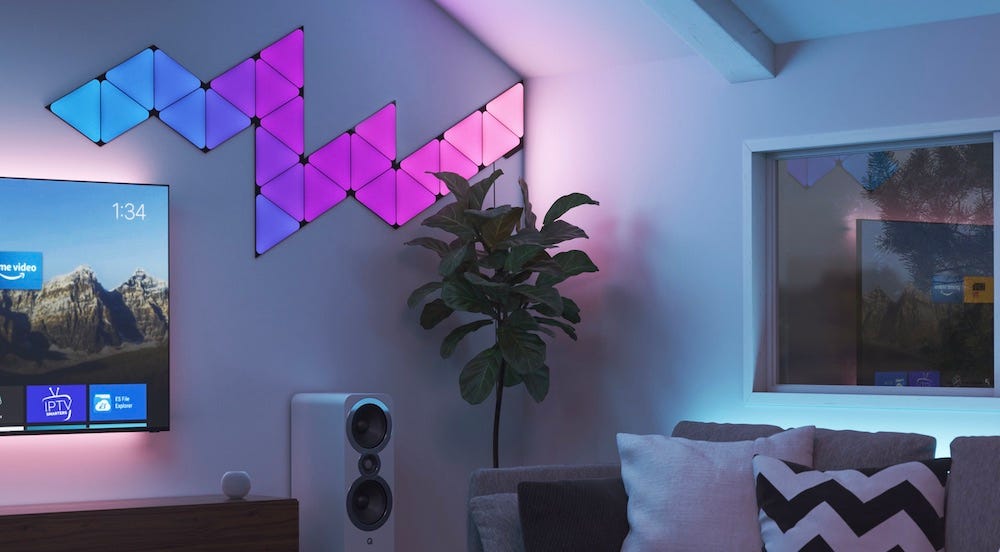Are our TV sets spying on us? 'It's pretty scary ... you should be worried'
Modern homes are full of AI-driven tech and apps programmed by algorithms. Do you know how to use it safely? We asked an expert for some advice...
Kia ora and welcome to Stocktake, in partnership with Kiwibank. Thanks to everyone who sent in suggestions for making savings after last week’s newsletter about the insanity of grocery shopping in 2022. (If you want more, here’s a great explainer from The Detail.) I received plenty of tips, like finding a cheaper butcher, and buying in bulk more often, which I intend to trial. One piece of advice came from someone who grows their own vegetables and makes their own soup. Tending a patch of organic cauliflowers sounds like a great idea – especially when they’re $6 each. But not everyone has the space, or time, or patience, to do so. Perhaps I’ll plant some now and in six months I’ll be a fully fledged cauliflower-monger. By then they might have tripled in price and I can fight Elon Musk over who buys Twitter. This week: home tech and AI.
- Chris Schulz, business editor
Your home is full of AI. Do you know how to use it safely?
A Ring security camera points down our driveway and films every visitor who comes to our door, catching everything from couriers to stray cats then sending notifications and footage to my phone. A Nest smoke alarm tells us off using a stern American accent if we leave the bathroom door open and moisture fills the hallway. A wifi-connected TV entertains us at night, and smart speakers soundtrack our days. The kids have one in each of their bedrooms, and my son just got his first iPhone.
The tech that fills our home, like many modern homes, doesn’t end there. A robot vacuum cleaner mops the kitchen floors and scrubs the carpets, interrupting our conversations if it thinks it hears its name – it’s called “Yeiko” – mentioned. Phones, laptops, gaming consoles and iPads full of algorithm-driven apps litter our house, begging to be picked up and updated with a chorus of notification pings, day and night.
This is fine, right?
Erm, no. “It’s all pretty scary,” says Alex Bartley Catt. “You should be worried … I don’t think I’m going to calm your nerves at all.” I’d called the managing director of Spacetime, an Aotearoa tech company that helps businesses get the best out of AI, to find out if all of my home tech is safe. I did so after spending the past week reading a collection of headlines like this, and this, and this. Here’s the worst one I could find: “Smart device warning: Homes ‘exposed’ to 12,000 attacks per week.”
What the hell is happening? Is any digital device safe to use any more? Should I consider adopting an Amish way of life and dump it all straight into the bin?
Bartley Catt gets asked this question a lot. Digital safety is often the first thing he’s queried about when he tells people what he does for a living. “People are worried about privacy,” he says. Mention the phrase “artificial intelligence” and they freak out. “There’s the Terminator, the end of the world, the singularity, all wrapped up in it.” People want to know if Jeffrey Bezos is listening through an Alexa smart speaker, or if their smart TV livestreams their living room antics to foreign tech hubs.
His response doesn’t allay any of those fears. Yes, your smart devices will be listening, if you let them. Bartley Catt uses our Samsung smart TV as an example. “TVs that are made today have a microphone. They’ll be listening to TV shows you’re watching to see if you’re being delivered certain ads in those TV shows and if certain product ranges are mentioned. Those TVs are definitely listening.” (I asked Samsung, the creators of our TV, for a response, and didn’t receive a reply, but here’s the tech giant’s global privacy policy.)
The problem, Bartley Catt says, is that no one checks their privacy settings. With each new app or smart device added to homes or phones, pages of intricate details are often agreed to with a quick swipe of a finger. “No one reads the terms of service. No one understands the settings,” says Bartley Catt. “We put too much trust in technology manufacturers.” That means unrelated apps may have access to internet browsing histories and location services, and use those details to then sell your data to marketers. Suddenly, you’re getting intricately personalised ads that are hard to resist. “They’re doing a whole lot of things to profile your personality and build a psychographic understanding of who you are and the people you know.”
At its worst, that means you’re stuck in a mega-marketing circle of hell. Walk past a shop, and you might receive an ad for something for sale inside that store, just like this bonkers scene in Minority Report. Talk to someone else with location services enabled and you might get served ads based on what your friend is into. “It gets as deep as, if you’re lying down in bed with your phone, you’ll be delivered different ads than if you’re sitting up with your phone,” Bartley Catt says. “The level of specificity they have and the ways they can market to you … is insane.”
The good news is that this can all change today. Bartley Catt recommends settling in for a fun evening of privacy management. That means diving into the settings of every single device and app, and making sure it can only access what you want it to. “You’ve got to go really deep to figure out what they’re really doing with that information and how it will impact your life,” he says. “It is hard, it’s time-consuming. It will inevitably make your life a little bit less connected.”
If it stops all those ads, it’s probably worth it. But, if that’s still not enough for you, you can go back to basics. Dump the phone, get rid of all your voice-activated tech, and return to a more primitive way of life. “Maybe you’ve got a dumb phone rather than a smart phone,” says Bartley Catt. “Maybe you buy a specific kind of computer that has really deep security settings.” He admits he hasn’t done this, and is about as bad as you and me at giving tech companies access to his personal data. “You would find me on Facebook, you’ll find me on most of the social media channels,” he says. “I actually love Google. It makes life easier, right?”
Balance, and understanding that tech companies always have the upper hand, is key. “If you’ve got an awareness about how advertising affects you and how it might make you to do certain things then maybe you can go some way to being mindful of it and not having it affect you so much,” says Bartley Catt. “It’s [about] being careful what you search for and what digital footprint you leave online.” Good luck out there.
Staying ahead of the curve with Kiwibank Business Banking: Kiwibank’s team of economists can help you make smarter decisions for your business. With their expert insights and forecasts your business is in safe hands with Kiwibank. To get tailored business advice you can trust, try Kiwibank’s Business Banking. Find out more here.
The story we’re obsessed with: Air travel chaos
Itching to travel? Same. But there’s a problem. It’s the middle of school holidays and many people are finding out that flying around the country or jetting off overseas for holidays isn’t what it used to be. If it sounds stressful, that’s because it is. Cloud systems engineer Shreyas Ramasubramanian tells Shanti Mathias he had multiple tabs open trying to find an alternate way to travel from Auckland to Wellington after his Jetstar flight was cancelled at the last minute recently. He ended up on the bus. The problem? Demand is increasing, but airlines don’t have the same pre-pandemic capacity. Add in staffing shortage woes, fuel cost increases and rising Covid cases and you’ve got a situation that might make you think twice about travelling right now.
The headlines you need to know about…
Later this week, Netflix announces its earnings figures and many are predicting it will be even worse than the two million subscribers it predicted it would lose. The New York Times reports the streaming service is betting big on The Grey Man, a big budget Ryan Gosling blockbuster out this Friday.
When a South Auckland liquor store began offering alcohol using the Afterpay credit service, arms did indeed go up. While the plans were put on hold, Reweti Kohere finds it could just be the start of a worrying trend.
Sports stadiums have hit the headlines lately, with Eden Park’s financial woes laid bare by Brian Finn, who argues that it’s a sinking ship that shouldn’t receive any more bailouts. And Anna Rawhiti-Connell gets on the case of the Christchurch stadium rebuild that is costing more the longer it’s delayed.
BMW is selling subscriptions to heated seats in its cars and the fallout has been brutal. “Where will this end?” asks The Verge, questioning whether we could soon see subscriptions for key fobs, stereos, or other basic car essentials that have always been included in the initial cost.
If you’ve noticed a certain R18 trend permeating through social media ad campaigns lately, you’re not alone. Vulture digs into why brands are hornier than ever. (It took all of my willpower not to use an eggplant emoji.)
Are newsletters the thing that will save media? Duncan Greive digs into upcoming Facebook changes that could become extinction-level events for some, then posits a future where newsletters just like this one replace your social media feeds. Bonus content: here’s his excellent interview with The Spinoff’s new newsletter boss Anna Rawhiti-Connell on The Fold.
Finally, we’ve been toying with: Nanoleaf light panels
It seems fitting to end a newsletter about the downside of home tech with a chat about some of the benefits. Nanoleaf makes striking light panel sets for home use. Controlled by an app, they’re great fun to tinker with, including settings that react to noise or movement, or colour schemes set to the seasons. We’ve got one in each of the kids’ bedrooms, so I asked founder Gimmy Chu how he imagines home tech will evolve, and he told me it was nowhere near its full potential. “I see the future of smart homes evolving into intelligence and automation, where all of your devices will work seamlessly together without needing your phone or even voice commands,” he says. “Everything will just automatically work as you need it to. So instead of walking into your entertainment space and fumbling with your phone to control your lights, your lights will know what you want them to do with automation.” Bonus: Nanoleaf does not record your conversations. (Nanoleaf.me, sets from $89.99) / Chris Schulz










